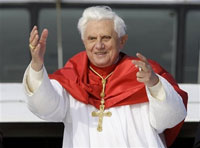Pope Benedict XVI praises Australian government
Pope Benedict XVI praised the Australian government Thursday for its "courageous" apology to the country's indigenous Aborigines for past injustices, saying it offered hope to all the world's disadvantaged peoples.

The remarks came as the pope began a busy day of public appearances in Sydney that are expected to draw half a million people to Australia's largest city and its famous harbor.
At a ceremony officially welcoming him to Australia, Benedict said the country's original inhabitants were an essential part of its cultural landscape, and cited their plight since the first British convict settlers arrived 220 years ago.
"Thanks to the Australian government's courageous decision to acknowledge the injustices committed against the indigenous peoples in the past, concrete steps are now being taken to achieve reconciliation based on mutual respect," Benedict said.
He said it was right to try to raise Aborigines out of poverty and raise their health and education standards to the level of other Australians.
"This example of reconciliation offers hope to peoples all over the world who long to see their rights affirmed and their contribution to society acknowledged and promoted," the pope said.
In February, new Prime Minister Kevin Rudd formally apologized to Aborigines as one of his first official acts after taking power, and made closing the gap between indigenous and non-indigenous Australians a priority of his government.
Aborigines are an often-marginalized minority of about 450,000 in a population of 21 million. They are the country's poorest group, with the highest rates of unemployment, illiteracy, incarceration and alcohol abuse, and a life expectancy 17 years shorter than other Australians.
Benedict also praised Australia for contributing to foreign peacekeeping operations, and touched on the problem of global warming - an issue he has signaled he wants Roman Catholics to think more about.
"With many thousands of young people visiting Australia at this time, it is appropriate to reflect upon the kind of world we are handing to the future generations," said Benedict, who has been dubbed the "green pope" by some observers.
Benedict emerged Thursday from three days of seclusion - a short holiday to help the 81-year-old pontiff recover from the more than 20-hour trip from Rome - to join World Youth Day, a six-day event designed to inspire a new generation of Roman Catholics.
More than 200,000 pilgrims have registered for the event, many from overseas. They thronged the city Thursday, bolstered by thousands of Sydneysiders who lined the harbor and city streets to see the pope pass by.
Earlier, Benedict was driven across the city's landmark harbor bridge to kneel in prayer at a chapel devoted to Mary MacKillop, who many Catholics here hope will be named Australia's first saint during the pope's visit.
Celebrated for her work caring for children last century, MacKillop was canonized in 1995 during the last visit to Australia by a pope.
Later, Aboriginal elders and dancers of the Gadigal people, wearing white ochre body paint and animal pelts, gave Benedict a ceremonial welcome. They shook eucalyptus fronds as a symbol of cleansing and good fortune while someone played a didgeridoo.
He then boarded a boat for a slow procession through the harbor. Surrounded by police boats and followed by a flotilla of private craft, the pope's large cruiser passed the Sydney Opera house to dock at a former cargo wharf where Benedict was to deliver an address to a huge crowd of pilgrims. He was to drive later through downtown in the popemobile - a trip that virtually shut down parts of the city.
The contents of the pope's address have not been released by the Vatican. During the flight to Australia, Benedict told reporters he wanted to heal some wounds caused by sexual abuse by clergy - a scandal that has dogged the church in recent years.
The pope's visit has triggered a fresh examination of the issue in Australia, a sour note to the festival that was made worse Wednesday when one of the key organizers, Bishop Anthony Fisher, said people should focus on the young pilgrims' goodness "rather than dwelling crankily ... on old wounds."
Victim support groups were angered by Fisher's remark.
Benedict's comments about Aborigines were not the first time a pope has recognized indigenous peoples.
In 2001, John Paul II issued a formal apology to the indigenous peoples of Australia, New Zealand and the Pacific islands for injustices perpetrated by Catholic missionaries.
Subscribe to Pravda.Ru Telegram channel, Facebook, RSS!

